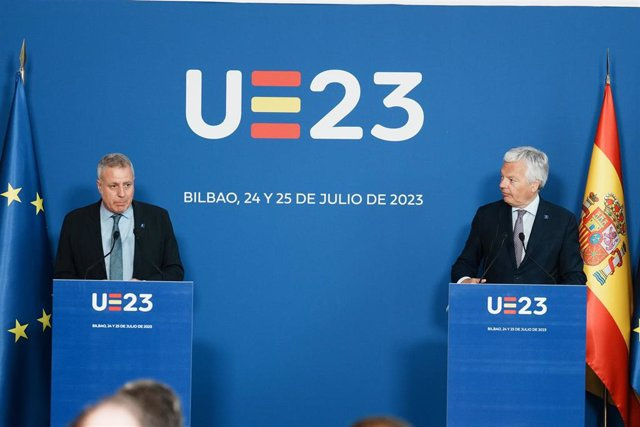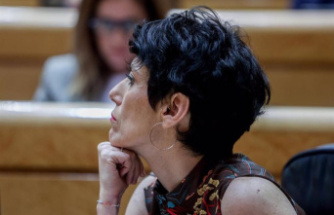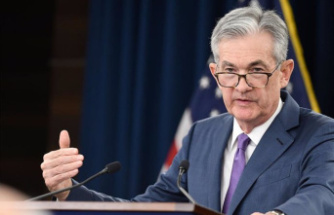Reynders highlights the sustainable economy as a way to competitiveness and defends the same protection for consumers online as offline
BILBAO, 24 Jul. (EUROPA PRESS) -
The EU Consumer Ministers, meeting this Monday in Bilbao, have shared "a clear and determined consensus" on "the need to act from consumer policies against the climate emergency and the fight against climate change".
In a public appearance to publicize the conclusions of the informal meeting of EU Consumer Ministers, the Secretary General for Consumer Affairs and Gaming of the Government of Spain, Rafael Escudero, explained that, for this, they intend to take "legislative and non-legislative steps", including the directive on the empowerment of consumers in ecological transition that, "if all goes well", will be approved in September under the Spanish presidency of the Council of the European Union.
For his part, the European Commissioner for Justice, Didier Reynders, who participated in the press conference, highlighted the sustainable economy as a "way to competitiveness", and defended the same protection for online and offline consumers.
Rafael Escudero began his speech by informing that, in this informal meeting of EU Consumer Ministers, work has been done, first of all, on what the new Consumer Agenda entails, the European framework of consumer policies that was approved by the Commission in 2020 and that has a period of validity until 2025, which is why it is at its halfway point.
In this sense, he stated that, at the meeting, the ministers shared "a positive assessment" of its development, and have begun to open the debate between the different states to see what the next steps would be in terms of consumer protection and the promotion of a sustainable consumption model from 2025.
Regarding the second part of the session, he explained that they have focused on the new steps for sustainable consumption, which "is a priority" of the Spanish presidency and the Ministry of Consumption of the Spanish Government.
"We have shared with the different states what would be the next legislative and non-legislative steps to take in this matter. We have revealed a clear, determined and shared consensus of all the delegations on the need to act from consumer policies against the climate emergency and the fight against climate change", he indicated.
In this sense, he has remarked that they have worked on some proposals that are under legislative files in the approval process, mainly three". One of them is the directive on the empowerment of consumers in the ecological transition and he has pointed out that they consider that "if all goes well, it can be approved under the Spanish presidency in September".
The other two legislative files, which he has also described as "very important", are on the right to repair and on ecological claims or the so-called 'Green Claims'.
"We think that the future of consumer policies in the coming months will go through the approval of these legislative files, and we have shared and advanced a lot in consensus between the different states on this matter," he assured. EUROPEAN COMMISSIONER
For his part, Reynders, after showing his gratitude to the Spanish Presidency and Escudero for having organized this meeting, has indicated that this meeting has provided the opportunity for the Ministers and Consumer Authorities to meet to discuss the Consumer Agenda that was presented in 2020, in which work is being done on digital and green transformation, and in which "advance has been made", both with legislative and non-legislative files.
Specifically, the commissioner mentioned that, within financial services, progress has been made in the consumer credit directive or in distance marketing of financial services to help consumers.
As he stressed, during the pandemic, more and more loans have been seen over the Internet and he has indicated that it is important "to offer the same protection to online consumers as to offline consumers".
Didier Reynders has ensured that there are different credit and payment schemes that are increasingly used by young people and that progress has also been made in intellectual cooperation and product safety, "something very important in the digital field".
The European Commissioner for Justice stressed that, thanks to the Spanish Presidency, it has been possible to maintain cooperation with officials in Latin America, but also with the US to address different cases, such as with the commission in charge of product safety in the United States or with the department in charge of financial services.
"In the end, we all face the same risks, the same challenges, we have to work hand in hand. After all, we see that the different players in the digital field have no borders," he stated.
Likewise, he pointed out that work has also been done in this meeting "with a vision of the future" and has recognized that he has been impressed by the commitment of all the participants "in the face of more sustainable consumption patterns and in the face of a more sustainable economy".
As he has stated, from the beginning of the Commission's mandate the Green Pact was launched, which "is now something globally assumed". In this sense, Reynders has pointed out that there are debates between politicians, between companies but also in society, regarding everything that is being done, and has assured that they have to demonstrate that "a sustainable economy is the way to the competitiveness of companies".
"Of course, we must also be attentive to the social dimensions of everything we do in terms of sustainable economy, in the future it will be increasingly important to work with these issues in mind," he said.
The European commissioner has defended that there are many files that still need to be closed under the Spanish Presidency and, specifically, he has referred to the file for the empowerment of consumers in the transition and the right to repair as an "important part of the circular economy", an area in which, as he has indicated, they want to move forward and will continue to work, not only through legislative proposals, but also through non-legislative proposals, such as commitments to sustainable consumption, "asking companies to go beyond what is required by law".
Didier Reynders has considered that, if all this is done together with the Spanish Presidency and it is possible to present new legislative texts, there is something that is "equally important" and that is "to properly execute and implement these laws", working with the CPC network (European Network for Cooperation for Consumer Protection) and with the networks of consumer protection organizations.
Lastly, he highlighted the importance of holding meetings like the one held in Bilbao because, in his opinion, "it is worth it" to meet a couple of times a year to share points of view and analyze the challenges they face and the way to deal with them.
"We are sure that in the next five years we will have to continue working on the digital transition, on the Green transition -we have seen it this summer-, we have had to face serious climatic conditions, commitment is also needed from consumer policies to deal with these phenomena", he concluded.
The informal meeting in Bilbao will continue this Tuesday focused on industry and domestic trade. The meeting will be attended by the Minister of Industry, Commerce and Tourism, Héctor Gómez, and the Secretary of State for the European Union, Pascual Navarro.













